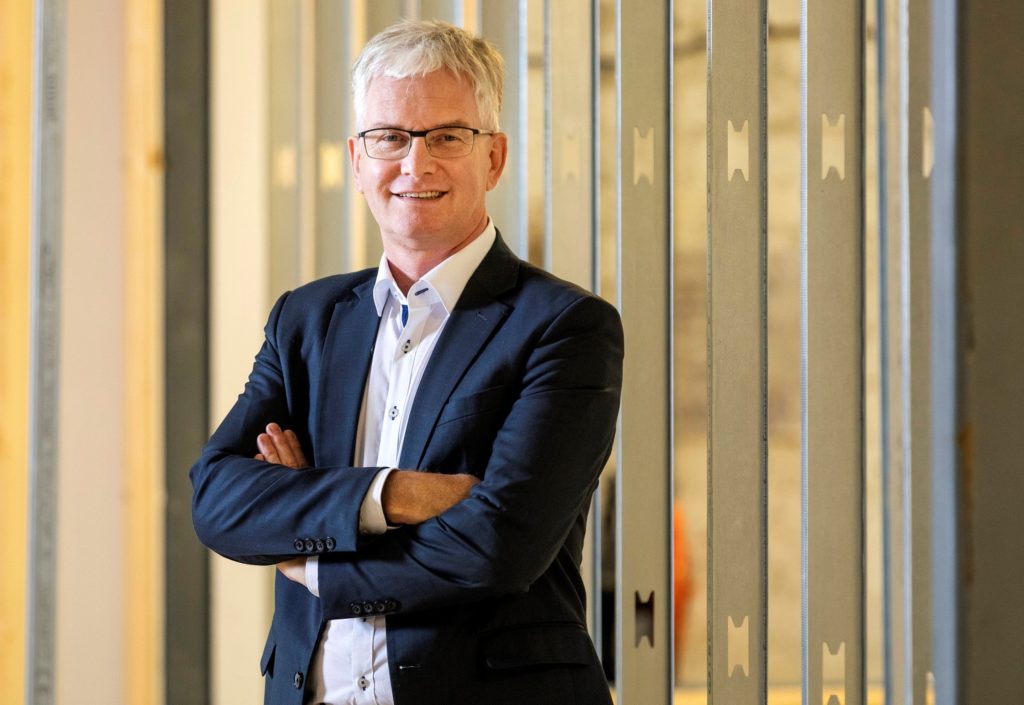Features - Business
Investment in Innovation and R&D Must Continue

The construction industry has seen a challenging six months since the onset of the Covid-19 pandemic. Businesses large and small have battled a gamut of obstacles, from introducing social distancing on site through to materials and staff shortages. In this latest feature by Mark Lowry, CEO of The McAvoy Group he discusses how investment must continue to avoid skills shortages.
However, while there’s no denying it has been a turbulent period, the lessons learned have enhanced the appetite for innovation – now very much rooted in necessity – particularly within healthcare and education. While the obstacles created by Covid-19 will continue to pose fresh challenges, the focus on and importance of MMC has never been greater.
As a result of the pandemic, increased uptake of MMC is now rooted in need – hospitals need new buildings delivered quickly, without the disruption of traditional construction, while schools need to limit impact on children’s education and provide the best possible learning environment. We have a real opportunity to do things differently, exploring all the options instead of simply delivering more of the same.
Improving productivity is also a major challenge, and one best tackled by increasing the use of MMC. The government has thrown down the gauntlet for the construction industry to improve output, and MMC is the answer – it reduces completion timeframes dramatically and, with buildings fabricated in controlled factory conditions, delivers a better finished product.
Recent years have seen countless buildings delivered that could have been completed much faster and to a better standard using offsite construction – yet for a multitude of reasons traditional construction was the default solution. In most cases, offsite wouldn’t have even been considered for the project – despite its many benefits. Even for projects where offsite isn’t the right approach, all MMC solutions should be fully considered – it will almost certainly prove of better value.
It’s clear MMC is the future of construction, but to increase it’s use we need to innovate – and for that we need the right skills.
While it’s positive that the pandemic has given MMC the chance to prove its mettle, it also risks creating a skills crisis. Unfortunately, redundancies are inevitable in a global recession, but we must ensure that pressure on the workforce and the need to cut costs doesn’t equate to a refusal to invest in new skills, innovation and new technology.
The industry must work together to ensure that we have the skills and knowledge to deliver projects, and prevent innovation and new technical advances slowing down or grounding to a halt. A focus on innovation and new technology will guide the industry through the crisis, coming out stronger at the other end – but we need skilled people to make that possible.
As an industry, we don’t have a great track record in collaborating in any meaningful way – that has to change if we’re to future-proof the sector, utilise MMC to its fullest and support the UK Zero Carbon Commitment, building in a more sustainable way.
The industry must set its own agenda or risk a dearth of skills as MMC powers ahead; the workforce lacking new technical skills.
To be clear, it would be a mistake to think the potential impact of the pandemic on skills has been ignored – quite the opposite, in fact; it has been discussed at length and was highlighted in the early weeks of the crisis when the outlook was much more uncertain.
But has enough been done in the months since?
Trade bodies have led the charge in protecting jobs, with the ECITB launching a new £5m scholarship designed to maintain a pipeline of new entrants into the sector, while setting out its priorities to support the modernisation of the industry and “deliver the skills and progression routes needed by the construction sector now and in the future.” These efforts are hugely important to the industry’s chances of success, keeping its agenda at the forefront, and providing financial contribution.
A recent report from RICS emphasised this point, setting out the broad range of bodies that play a role in ensuring that we have the skills we need for the future, from universities through to professional membership organisations and of course, the government.
However, the most vital segment in driving future skills is private businesses – whether architects, contractors or engineers. And the industry has much work to do in order to facilitate the level of collaboration we need to make a difference, sharing expertise and knowledge and being prepared to tackle challenging issues together – sharing both the risk and the benefit.
McAvoy Group is very proud to be part of the Seismic Consortium, which comprises a range of businesses, all experts in their respective fields – including Elliot Group, a fellow offsite specialist – to create a universal connection solution and standardised structural frame. By working together and pooling expertise, insight and resources, Seismic has revolutionised the way schools can be built. The second part of the project, Seismic II has now also began, building future skills and driving R&D – it’s an excellent example of what can be achieved with a commitment to collaboration and a focus on a single, shared goal.
Though the construction sector is working through an extremely challenging operational environment, and with significant pressure on margins, we must keep talking, working together and collaborating to build a solid foundation for the future.
We must all continue investing in skills and technological capabilities now, resisting the urge to retreat and conserve spend intended for R&D if we’re to prevent a dearth of expertise in the future.
If you would like to read more like this, then please click here
Related Articles
More Features
- Ten years of progress on payment, pre-qualification and skills
19 May 25
The industry has made significant progress on late payment, pre-qualification, and competence since the formation
- Pagabo provides clarity on impacts of new NPPS and PPNs
12 Mar 25
The Labour government’s new National Procurement Policy Statement (NPPS) sets out strategic priorities for public
- How is the Procurement Act going to drive social value
24 Feb 25
The regulations laid out within the Procurement Act 2023 will go live today.






